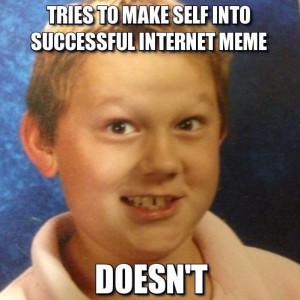Do the Faces Behind Memes Have Legal Rights?
Grumpy cat, Overly Attached Girlfriend, and Bad Luck Brian –these are familiar terms for anyone with a social media account. “Memes” are viral creations that are prevalent in Internet culture and are spread from person to person. They are often catchphrases, videos, or images used to mock, satirize, or convey a concept.
 Most memes are harmless images that poke fun at relatable topics, like First World Problems Girl, but sometimes the use of images and concepts are less than pleasant or fun. For example, no one wants to be known as Scumbag Steve, a meme about unethical behavior regarding hedonistic tendencies, but Blake Boston will forever be known as the face for this meme. Luckily, Boston isn’t bothered by the infamy; instead he embraces his celebrity and uses it to connect with other Internet personalities.
Most memes are harmless images that poke fun at relatable topics, like First World Problems Girl, but sometimes the use of images and concepts are less than pleasant or fun. For example, no one wants to be known as Scumbag Steve, a meme about unethical behavior regarding hedonistic tendencies, but Blake Boston will forever be known as the face for this meme. Luckily, Boston isn’t bothered by the infamy; instead he embraces his celebrity and uses it to connect with other Internet personalities.
Unfortunately, not everyone can have the same experience as Mr. Boston. Kyra Pringle knows firsthand how devastating and cruel the Internet can be to a loved one. Her two-year old daughter suffers from a rare genetic disorder, which caused unique facial features. After celebrating her daughter’s birthday, Pringle shared a photograph of her child on Facebook. The image was meant for family and friends, but the picture quickly became a meme. People were using rude captions and compared her ill child to a monster, leprechaun, and alien.
Since memes are so popular on the Internet, what can you do if someone uses your photograph for a meme? Some believe it’s a First Amendment right and that content shouldn’t be restricted on the Internet. Others say this is a privacy law matter and that they have a right to be forgotten and left alone.
Internet laws are still slow to the debate and there aren’t any laws that truly protect individuals from becoming memes or having their pictures used in this manner. However, some social media companies are taking on the task and have terms and conditions that ban the use of inappropriate images, especially if the use is the same as Pringle’s situation.
The misuse of photographs is not a new concept, but memes are more difficult to police because there is no commercial purpose behind the sharing. Creating memes is viewed as an artistic or political expression. Unless legislative action happens, it seems the only way to stop this cruel practice is the same way it started–through online users. Online users can create and spread memes, but these same users can also stop the perpetual cycle and police their own online communities. This may not be the best answer for those that are victims of memes, but it seems you just have to hope that your time in the limelight truly is only fifteen minutes of fame.


Comments